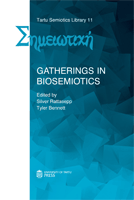
Abstracts for the 12th Gatherings
Abstracts for the 12th Gatherings
Pre-seminar I Pre-seminar II Main programme
More...
Pre-seminar I Pre-seminar II Main programme
More...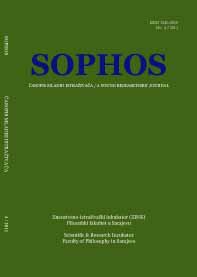
Keywords: body; corporeality; bodyness; phenomenology; perception; world; consciousness
In this paper, I problematize Merleau-Ponty’s notions about body and bodyness developed in his major work Phenomenology of Perception. Particular understanding of the phenomenon of the body in Merleau-Ponty’s ontology is shown to be crucial, since it is the place out of which the ontological significance of perception is carried out and constituted from. The main goal is to point out that it is the holistic character of perception that which enables us to approach the phenomenon of the body from the ambiguous position: philosophical and methodological. This ambiguity enables us then to access the phenomenon of the body from at least three important aspects: philosophical, psychological and historical. Each of these three aspects is important if we wish to understand the basic phenomenological relation body-world-consciousness, hence, in this paper I also discuss the area of psychopathology, which, inasmuch as it opposes the “normal” provides clearer and more precise understanding of the phenomenon of the body.
More...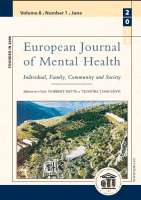
Keywords: posttraumatic stress disorder; bio-psycho-social model; therapy; psychotherapy; Eye Movement Desensitisation and Reprocessing; Autogenic Training; case study
In our case study, we illustrate the use of Eye Movement Desensitisation and Reprocessing (EMDR) and Autogenic Training (AT) in PTSD treatment. EMDR was used to manage the acute symptoms, while AT was used to enhance the resilience in persisting stress. Using the bio-psycho-social model of mental illness, we discuss the socio-political and socio-psychological aspects of this case that has put a burden on the relationship of two neighboring nations (Slovakia and Hungary) as well as on the relationship of the national majority and a minority within our country (Slovakia). Our patient consented to this report being published, and we hope that it will contribute to a more realistic evaluation of this event in society.
More...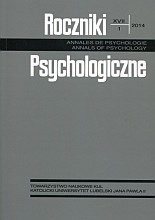
Keywords: noetic perspective; cognitive representation; information processing; lexical decision task
The aim of the present research was to investigate the cognitive representations of the noetic perspective(spirituality) and the influence of the activation of these representations on informationprocessing. The article presents the results of three experiments on groups of students (N = 186), using the lexical decision task (LDT) paradigm. In two of these experiments the depth of informationprocessing was also measured by a memory test. The typical result for LDT procedure was notconfirmed – the noetic perspective did not cause faster recognition of words related to this perspective.However, the activation of the noetic perspective in the condition of activated attention manifesteditself in a better memory of noetic words and in the transfer of positive affect to relatednoetic objects.
More...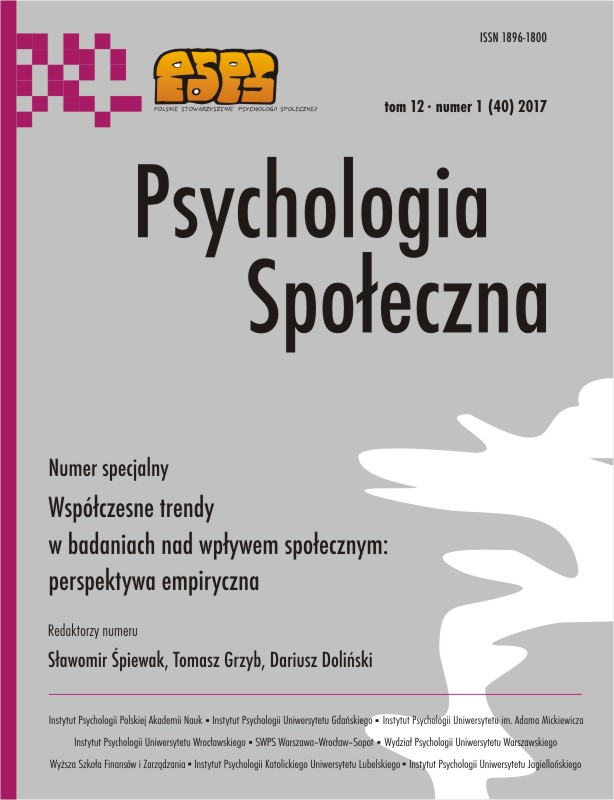
Keywords: chameleon effect; mimicry; imitation; compliance; social influence
Over the last few decades research into the psychology of compliance and social influence has resulted in the discovery of new methods for influencing the behavior of others. Inspiration for further research may be found in the area of mimicry, and, especially, the chameleon effect phenomenon. The main goal of present article is to review experiments from that specialization within social psychology, and to highlight links between mimicry, the chameleon effect, social influence, and compliance.
More...Keywords: emotion regulation goals; cognitive emotion regulation strategies; emotion regulation;
The issue of the relationship between the goals of the emotion regulation and the emotion regulation strategies has been extremely rarely taken into consideration in an explicit way by the researchers interested in the emotion regulation domain. The present study was aimed to be a contribution in that respects, through an exploratory correlational research on 91 first year students from the University of Fine Arts and Design from Cluj-Napoca (mean age: 20 years). In order to investigate the goals of the emotion regulation, there were used an ad hoc instrument, The Questionnaire for the Emotion Regulation Goals (QERG), elaborated by the author of this study, and the questionnaire Self-Regulation of Withholding Negative Emotions (SRWNE), elaborated by Kim, Deci and Zuckerman, in 2002. The cognitive emotion regulation strategies were assessed with a Romanian version of the Cognitive Emotion Regulation Questionnaire (CERQ), elaborated by Garnefski, Kraaij and Spinhoven in2001. Synthetically speaking,, the main result was that the preference for the cognitive emotion regulation strategies considered in the scientific literature to be adaptive and desirable (as positive reappraisal, refocus on planning, putting into perspective are)was positively associated only with the preference for some of the investigated emotion regulation goals: the autonomous goals, the goals aiming the complete elimination of an undesirable emotion, of helping the attainment of another personal goal(instrumental ones), or aiming the understanding of one’s own personal affective feelings. Given the exploratory nature of the study, future research is needed in order to see which of the obtained results are accidental and which can be replicated.
More...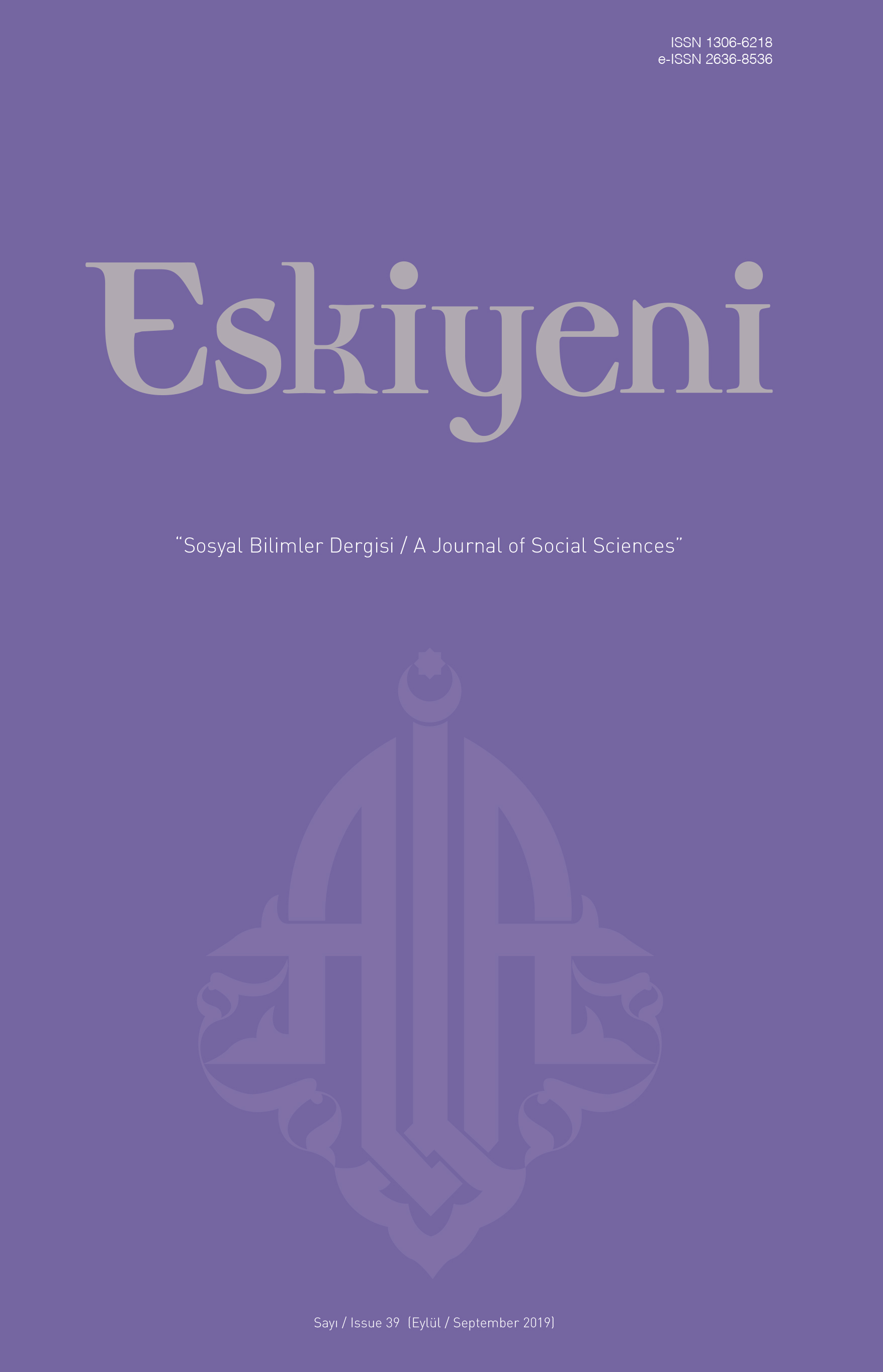
Keywords: Psychology of Religion; Religious Education; Hacı Bayrâm-ı Velî; Spiritual education; Existential themes; Self; Mindfulness;
Hacı Bayrâm-ı Velî (Ḥājjī Bayrām Walī) in his time did not remain indifferent to the problems of the society, and in solving the problems he highlighted the purpose of human existence and the search for meaning. Although the concepts in poems he wrote shed light on the needs of his time, it can be said that today’s people continue to be up-to-date in terms of responding to the universal needs and existential quests common to his self. The language and approach used in his poems are designed to address the subjective experiences and meaning processes of each individual. Similarly, he devoted importance to spiritual education and sought the solution of individual and social problems in this way. It can be said that Hacı Bayrâm-ı Velî, in particular, has handled the meaning attributed to the existence of the human being from the perspective of monotheism (tawhid). In this study, which aims to examine existential themes related to spiritual education (irshad) in Hacı Bayrâm-ı Velî’s poems, the main existentialist themes that come to the fore are as fol-lows: The emergence of inner life, awareness of the purpose of existence, spiritual needs, spiritual change and transformation, the idea of unity and harmony with the Creator.
More...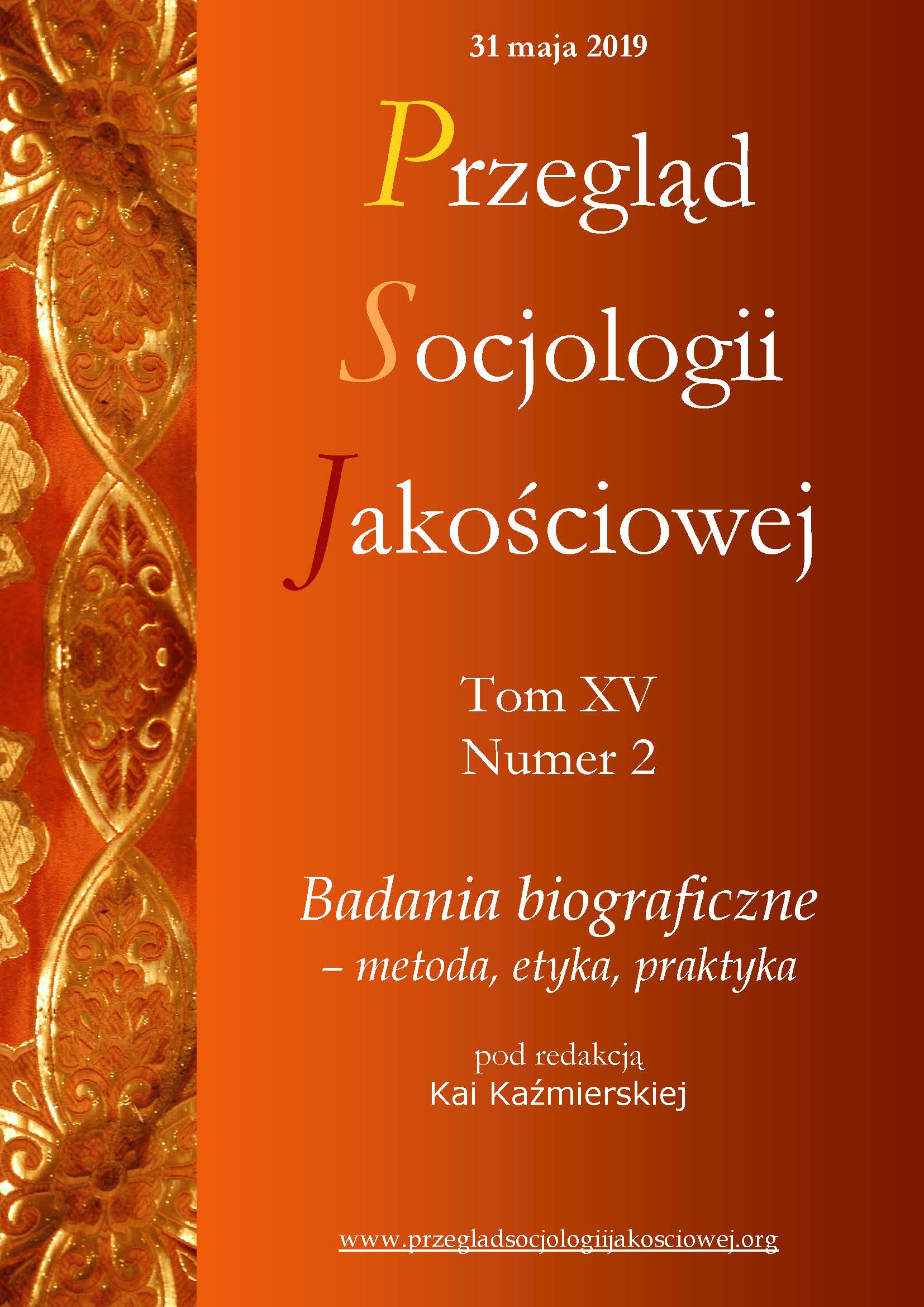
Keywords: oral history; biographical method; life story; autobiographical narrative interview; interdisciplinarity; ethical dilemmas
Reflections undertaken in this article are a direct result of the research into the fate of Children Born of War (CBOW) in Poland and relate to the methodological, epistemological and ethical tension experienced while working with the interview partners and analyzing their biographical accounts. The encountered difficulties became a root cause of the critical reflection and an impulse to an attempt to systematize the knowledge about the mutual relations of two research traditions: oral history and biographical method which have coexisted over the past few decades, interfering and penetrating each other to such an extent that many researchers began to equate them or consider one of them as a part of the other and vice versa. The chaos of terms and concepts was of great importance in this process. The text also presents similarities and differences of the two approaches both in an epistemological and ethical sense. The attitude towards the narrator, which is mainly the result of different scientific goals that researchers aim at in both research fields was recognized as the fundamental difference. However, underscoring the differences has no purpose of setting boundaries, but it is a postulate to be more careful and bear theoretical and methodological self-awareness of researchers, it is also meant to foster mutual learning and inspiration, which can positively affect the quality of research and analysis.
More...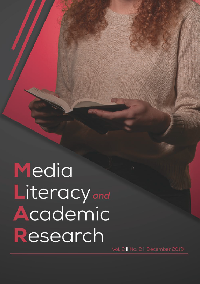
Keywords: Traditional children’s games; Cultural preservation; Heritage; Child’s growth and development; Education; Facebook; Social media; Campaigns;
Malaysia is a nation rich in culture and heritage because of its multi-racial society that consistsof different ethnic groups. Part of this rich cultural heritage are the various traditional children’sgames that have existed for a long time, such as Congkak (filling the wooden board), BatuSeremban (tossing the stones), Sepak Takraw (kicking the rattan ball), Gasing (spinning top),Wau (kite flying) and many more. However, with the development of digital technologies andthe impact of globalization, traditional children’s games that were once very popular in oursociety are now slowing fading away. This campaign is carried out using social media, with theaim to explore the values of Malaysian traditional children’s games and to reintroduce thesegames to children and the general public. The project consisted of a traditional children’sgames workshop and an online campaign using Facebook, which targeted a larger audience.The findings of this project revealed that traditional children’s games are beneficial to a child’sgrowth and development, cultural values and teaching practices. Therefore, it is important forthe present generation to preserve, promote and relive Malaysian traditional children’s gamesand to pass them on to the next generation.
More...
Keywords: Romanian; contemporary; literature;criticism;
Literary reviews signed by young literary critics.
More...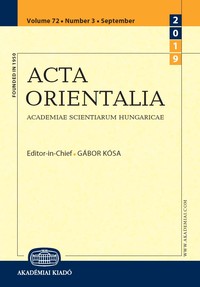
Keywords: variations; seven heavens; al-Kisā'ï; manuscripts; Islam; angels
This contribution presents the concept of 'seven heavens' as preserved by eight manuscripts of Muhammad ibn 'Abdallah al-Kisâ'ï's collections of Islamic religious tales Kitab A’ğāi’b al-MalakUt and Qisas al-Anbiyā It focuses on and compares the contents and composition of the chapter devoted to the topic and analyses the variations in the mss., which shed light on the way the tales are transmitted. Some of them represent variability in the original information, whereas others (including significant semantic shifts) may easily have emerged as a result of even minor scribal lapses.
More...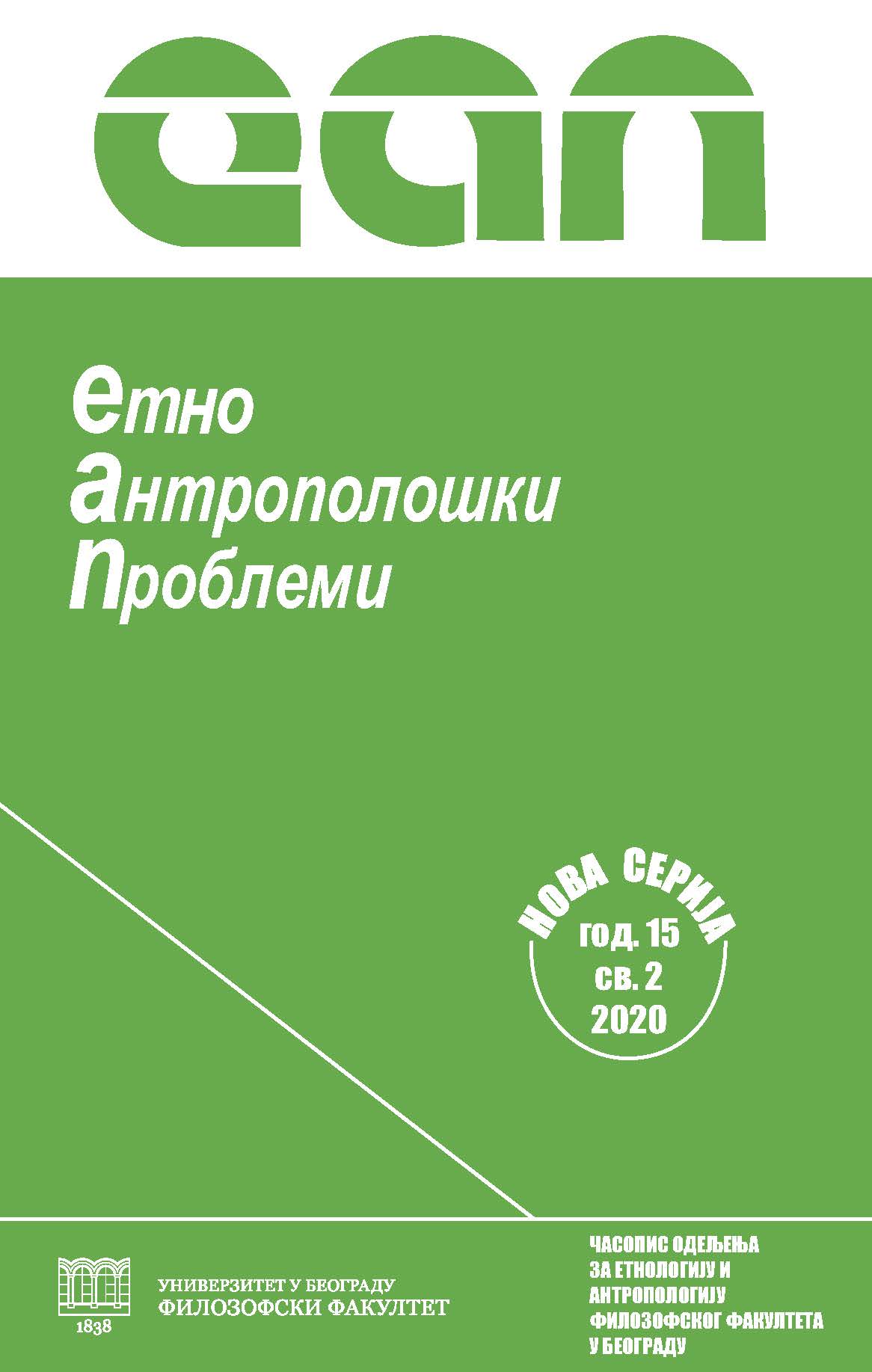
Keywords: neoliberalism; psychotherapy; postsocialism; the self; self-improvement; Belgrade
The processes of neoliberalization and European integration in Serbia have been underway for some time, and in addition to their effect on certain elements of the social structure such as the family, the economy, political life etc., their impact is also evident in the way that Serbian citizens perceive themselves and their position in this environment. Due to reduced social protection, the withdrawal of the state from the public sphere, and increasing financial and employment insecurity, individuals are obliged to assume responsibility for their lives and to engage in self-improvement with the aim of personal development and the finding of new survival strategies. Through interviews with psychotherapists and persons who have used the services of private psychotherapy, this paper looks at the relationship between private psychotherapeutic practice in Belgrade as a technique for self-improvement and the construction of the self in its clients, and then relates it to the broader socio-economic context in which the respondents live and work. The findings suggest that with regard to its clients, private psychotherapeutic practice mirrors the emphasis on independence, autonomy and responsibility for one's life and life decisions, which are typical features of the entrepreneurial self characteristic of the period of post-socialist neoliberalization.
More...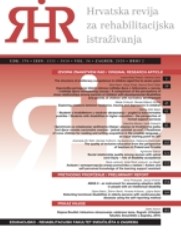
Keywords: attachment patterns; quality of family functioning; social support; children of normative development; children with developmental disabilities;
The aim of this research was to compare the close relationships of two groups of parents, parents with a child of normative development and parents with a child with developmental disabilities. A total of 193 parents of 4- to 5-year-old male children participated in the study, of which 116 were parents of children of normative development and 77 parents of children with disabilities. The following measuring instruments were used to answer the research questions: State Adult Attachment Measure, Quality of Family Functioning Scale, and Social Support Scale. Non-parametric statistical procedures were used for data analysis. The results of the study indicate that close relationships among parents of children with disabilities are characterized by greater security-seeking. The quality of family functioning is the same for the two groups of parents, while parents of children with disabilities receive less support from friends. Also, the results of this study support the conclusion that mothers with a child with a disability are more likely to seek closeness from close others than fathers from the same group of parents. The findings indicate the importance of considering families as a system, especially those families with a child with a disability, which may include different programs aimed at working on family dynamics and partnerships, especially in vulnerable families.
More...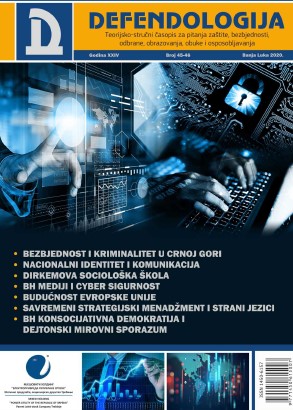
Keywords: Social media; national security; cyber security; Western Balkan; B&H; Instruments; Strategy; ethno-politics; institutions;
Dobar sistem sigurnosti predstavlja najveći stupanj jedinstva različitosti što znaci da se sve različite pojedinosti dovode u međusobni sklad. BiH nema adekvatnu cyber sigurnost: privatizacija političkog utjecaja, nedovoljna institucionalna saradnja, fundamentalno negativan politički ambijent (etnopolitičko institucionalno ustrojstvo), fragmentiran cyber prostor (država-entiteti-kantoni), nedostatak finansija, naučno-istraživačkih okvira i stručnih ljudskih resursa. Dobro upravljanje, tj. država, treba se temeljiti na neovisnosti, stručnosti i integritetu institucija i pojedinaca. Imenovanje i zapošljavanje u javnom sektoru stranačkom praksom zahtjeva hitnu analizu i sistematske reforme. Upotreba društvenih medija može ugroziti nacionalnu sigurnost ili pomoći u ostvarenju državnih strateških interesa. Mehanizmi odbrane i instrumenti moraju biti pažljivo prilagođeni, po uzoru na razvijenije zemlje, s posebnim osvrtom na monitoring korištenja društvenih medija, posebno za organizacije s više ili manje linearnim strukturama. Svijest društva o cyber sigurnosti bitna je za prihvatanje i provođenje mjera sigurnosti informacija na svim nivoima i u svim vremenskim okvirima.
More...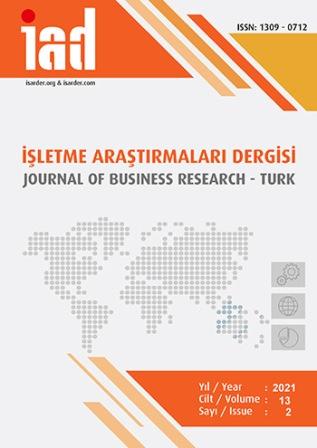
Keywords: Green transformational leadership; Green intrinsic motivation; Employee green behavior (in-role); Scale adaptation;
Purpose – The purpose of this study is to adapt green transformational leadership scale, green intrinsic motivation scale, and employee green behavior scale into the Turkish language. Besides, the current study aims to determine the effect of green transformational leadership directly and indirectly (through green intrinsic motivation) on employee green behavior. Design/methodology/approach – In this quantitative study, the data obtained by using the survey technique. The current study used simple random sampling and the data obtained from two different samples. Participants of the first sample (n=143) were chosen from an automotive company, and participants of the second sample (n=174) were chosen from a textile company. For analyzing the research findings, SPSS, Amos and Process were used. Findings – As a result of the analysis, it was determined that the scales are reliable and valid. In addition, analysis of hypothesis tests showed that green transformational leadership positively affected the employee green behavior both directly and indirectly (through green intrinsic motivation). Discussion - It was determined that the scales used in the research were used to studies in Turkey. In addition, it has been concluded that both green transformational leadership and green intrinsic motivation are important factors in increasing the employee green behavior.
More...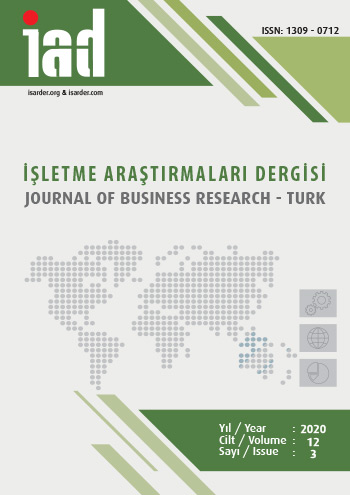
Keywords: Gossip; Gossip in organizations; Workplace morale; Work effort;
Purpose – Gossip harms organizations due to the several negative consequences it causes in the work environment. It creates discomfort in the working environment and causes low morale in organizations. In addition to preventing those who gossip and those who are subject to gossip from working, it also leads to a decrease in the work effort of employees by the low morale it creates. Previous research has revealed that understanding gossip mechanism and its effects is important for organizational practitioners and there is a need for the development of a more rigorous analysis of the role of organizational gossip with reference to the effects it can have for the organization as a whole, its managers and its workforce. However, there is a lack of academic research addressing the gossip in organizations. This study aims to fill this gap by examining the effect of gossip in organizations on workplace morale and work effort. Design/methodology/approach – In the study, a conceptual framework was formed by searching the literature and a questionnaire was prepared by using well accepted scales. Data was collected from ten companies operating in manufacturing sector in Istanbul using convenience sampling method between October 14th and December 22nd, 2019. 397 fully filled questionnaires returned from employees, working at least for three years in the same company, have been analyzed with SPSS statistics program. Finally, reliability, factor, correlation and regression analysis were performed on the obtained data, and hypotheses were tested. Findings – The results reveal that gossip in organizations has a negative effect on both workplace morale and work effort, and additionally workplace morale has a moderating effect on the relationship between gossip in organizations and work effort. Discussion – Today gossip in organizations is a bigger problem than ever before. Although gossip is a part of life and thus neither the managers nor the human resources departments can completely eliminate gossip in organizations, they can take steps to control and stop the people who gossip and spread gossip in the organization by using strong communication channels within the organization, by training the employees about the potential harms of the gossip, and by applying organizational policies that contain sanctions about gossip.
More...
Keywords: teal organization; transgression; organizational change; nonviolent communication by Marshall Rosenberg;
The article discusses issues related to the real and imaginary limitations of the functioning of teal organizations. Both categories of boundaries are thought constructs, and the proposed distinction is determined by the process of transgression. A crossed barrier becomes an imaginary boundary, the one to be defeated remains real. The analysis of boundaries and transgression was based on the theory of psychotransgressionism by Józef Kozielecki, and the case study concerned the Krakow teal organization – Leance. The primary focus was on the area of communication, relations and interactions.
More...
Keywords: -T Trading Zone; Addiction Recovery; Psychodynamics; Alcoholics Anonymous Ethnographic
This is an essay about addiction recovery based on a trading zone psychological methodology between an Aristotelian-Thomistic [A-T] psychology of addiction, particularly alcohol/drug addiction. It is an applied psychology where we cross over to other disciplines and exchange theories and practices with a specific target of addiction recovery in mind. We could say that we are interested in learning and borrowing for the sake of problem solving within complementary disciplines. The complimentary disciplines in this A-T psychology trading zone are psychoanalytical psychodynamics and a psychoanalytical ethnographic analysis of Alcoholics Anonymous. We use the terminology in the essay of module construction, i.e. module 1) The Habituation Perspective of the Addiction Trading Zone, 2) A-T Addiction Psychology and a Psychodynamics of the Searching-Recovering Soul, and 3) The Searching Recovering Soul, A Psychodynamic Conversion of Anxiety & Habituation. Each module contains psychological concepts that are considered as necessary for a synergistic action solution to the issue of alcoholic/addiction recovery. An A-T psychological trading zone module construction is hierarchical. It, therefore, requires that module one is grounded on an A-T metaphysical psychology that allows for a fitting exchange of principles, concepts, and techniques on the issue of addiction.
More...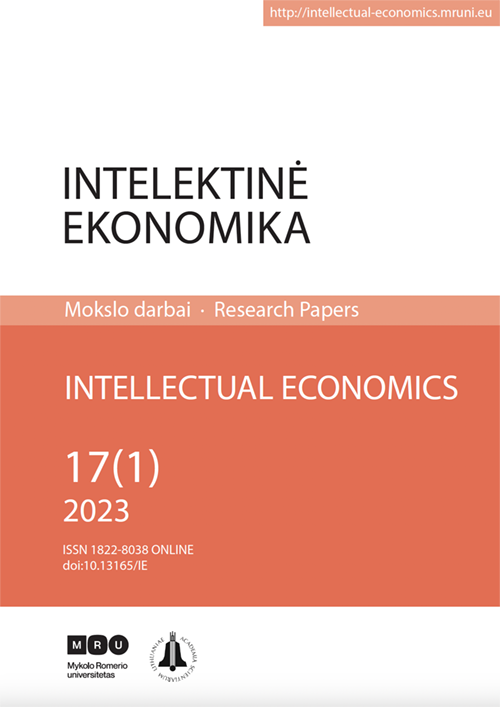
Keywords: intellectual capital; business performance; open innovation; strategic flexibility; sustainable competitive advantage;
Purpose: This study examines sustainable competitive advantage in the SME sector, which consists of three determinant factors: business performance, open innovation, and intellectual capital. It also extends the accepted procedure to include the effects of technology adoption and strategic flexibility. Design/methodology/approach: The target sample consisted of 210 export SMEs in Bali, Indonesia. This study employs a self-administered questionnaire distributed to managers and key employees, with 630 surveys successfully collected and PLS-SEM used to analyze the data. Findings: This study corroborates the notion that intellectual capital is crucial in building sustainable competitive advantage. Further, these results also highlight the roles of technology adoption and strategic flexibility as strategic factors that reinforce intellectual capital and indirectly affect sustainable competitive advantage. The results of this study present an insightful understanding to theorists and managers regarding how the sustainable competitive advantage of SMEs faces global competition. Originality/value: This paper is the first study to integrate technology adoption and strategic flexibility to enhance a sustainable competitive advantage-based performance model in the SME sector. Research limitations/implications: The primary limitation involves the data collected from SMEs in Indonesia. Given the difference in SME managers’ attitudes and behaviors, the findings of this study are most likely not able to be generalized. Practical implications: SME managers are required to offer employees opportunities to transmit their knowledge into great ideas. Consequently, managers are to innovate constantly, using relationships to obtain knowledge, creating unique knowledge for the organization, and meeting market expectations.
More...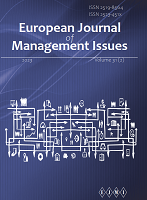
Keywords: Platform Ecosystems; IIoT Platform Ecosystems; Partner Management; Partner Program; Systematic Literature Analysis;
Purpose: This study aims to determine the current state of research on partner management in the context of IIoT platforms that rely on partnerships and act as innovation engines. Design/Method/Approach: The applied research method is a systematic literature analysis supported by a concept-centric synthesis. The literature sample comprises thirty papers. Findings: The results indicate that few frameworks exist to improve and professionalize partner management in practice, and only a few papers focus on IIoT platform ecosystems. In contrast, some articles empirically examine individual determinants of partner management in detail. Based on these results, a conceptual framework is derived to organize and distinguish the determinants of partner management and the related concept of partner programs. Theoretical Implications: The study contributes to the research stream on partner management in IIoT platform ecosystems and enterprise software ecosystems, synthesizing the existing research and highlighting the importance of curated support of partners as a competitive lever between platform ecosystems competing in the same domain. Practical Implications: Practitioners can use the derived framework to structure partner management activities and make more informed decisions based on the structured view of decisions summarized in the conceptual framework. Originality/Value: Due to the critical role of complementary partners in innovating upon IIoT platforms the framework is an important foundation for further research on the individual determinants of partner management in the context of digital platforms. Research Limitations/Future Research: The derived conceptual framework was not empirically validated. Empirical follow-up research could refine and develop the framework into a taxonomy using systematic procedures. Paper Type: Conceptual
More...